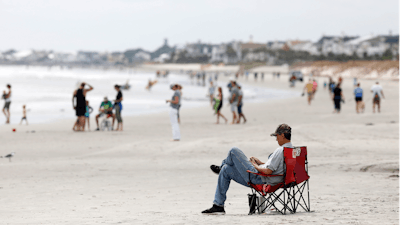
COLUMBIA, S.C. (AP) — Environmental groups sued the Trump administration Tuesday over offshore drilling tests, launching a legal fight against a proposal that has drawn bipartisan opposition along the Atlantic Coast.
The lawsuit filed in federal court in Charleston, South Carolina, claims the National Marine Fisheries Service violated the Marine Mammal Protection Act, the Endangered Species Act and the National Environmental Policy Act when it issued five permits for the use of seismic air guns.
"This action is unlawful and we're going to stop it," Diane Hoskins, campaign director at OCEANA, said in a news release. "The Trump administration's rash decision to harm marine mammals hundreds of thousands of times in the hope of finding oil and gas is shortsighted and dangerous."
The coalition includes OCEANA, the Southern Environmental Law Center, the Natural Resources Defense Council, Earthjustice, Center for Biological Diversity, Surfrider Foundation, Defenders of Wildlife, One Hundred Miles and the Sierra Club, as well as the South Carolina Coastal Conservation League and the North Carolina Coastal Federation.
The blasts are conducted in preparation for potential offshore drilling, which the administration has proposed to expand from the Atlantic to the Arctic and Pacific oceans. The five-year plan would open 90 percent of the nation's offshore reserves to private development.
Survey vessels will be required to carry observers to listen and watch for marine life and alert operators if any protected species comes within a certain distance. Surveys would be shut down when certain sensitive species or groups are observed, and penalties could be imposed for vessels that strike marine animals.
But the precautions aren't enough for environmental groups, who've said the blasts can disturb wildlife. Industry groups say the surveys have been conducted around the world for decades, with little adverse impact.
The issue has stirred emotions along South Carolina's coast, with cities and municipalities mounting vocal opposition. But there are still supporters of drilling, which some say could mean an economic boon for an area increasingly reliant on tourism.
State Sen. Stephen Goldfinch is a Republican who represents portions of the coast and, last year, told a U.S. House panel that coastal oil and gas exploration "could write the next chapter" for areas such as his. He said Tuesday he understands constituents' fears about the potential for oil-related environmental problems but says seismic testing could lead to finding natural gas deposits, which could bring an economic boon.
"I love tourism. I appreciate tourism," Goldfinch told The Associated Press, of the state's $20 billion industry, mostly centered on coast. "But I'm telling you, the people of the coast are tired of being tied to tourism. It scares us to death every time there's a storm that comes and shuts it down."
The drilling issue has created strange political bedfellows along the East Coast, with Democrats and Republicans in some areas united over it. In South Carolina's 1st Congressional District, Republican Katie Arrington — a supporter of President Donald Trump who initially said she stood by his drilling plans — later backed off that support amid a growing wave of drilling opposition in the coastal district she aimed to represent.
Arrington ultimately lost the general election to Democrat Joe Cunningham, a drilling opponent who collected support from coastal Republican mayors. Voters said they'd been turned off by what they saw as Arrington's flip-flop on the issue.
Earlier this year, South Carolina Gov. Henry McMaster - an early backer of Donald Trump's candidacy - was among state executives to request a drilling waiver, seeking the same sort of promise already given to Florida Gov. Rick Scott, another Trump ally. Since then, officials from the Department of the Interior have said Secretary Ryan Zinke's promise to Florida wasn't a formal action and will instead be part of the department's analysis as it completes its plans.
Mike Covert, a Republican member of the Beaufort County Council planning a 1st District run in 2020, acknowledged the emotion surrounding the offshore drilling issue but pointed out safety improvements since disasters such as the 2010 BP oil spill in the Gulf of Mexico and pointed out the potential economic benefits shale gas exports could bring to the state.
"If we were able to export shale gas, our economy in South Carolina would change to remarkable proportions," Covert told AP. "We would be able to seriously talk and have the conversation of reducing or eliminating the income tax, for example."
On Monday, ahead of the lawsuit's filing, Cunningham told The AP he backed the legal effort, which would pair with legislative action he plans to take up in the U.S. House. "I'm going to go up to D.C. and fight like hell," Cunningham said. "These lawsuits are one tool in our bag that we're going to use."






















